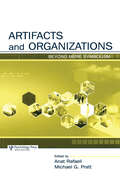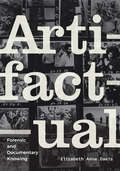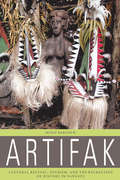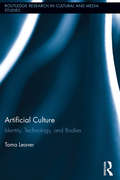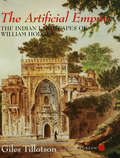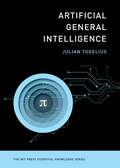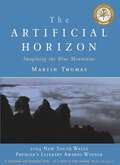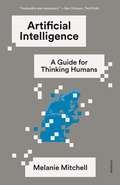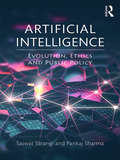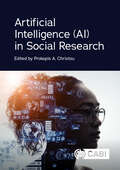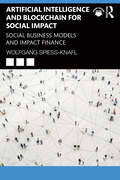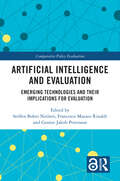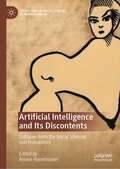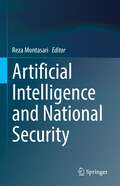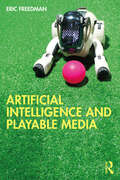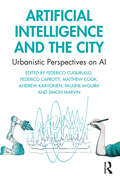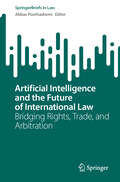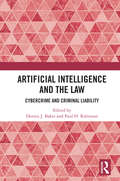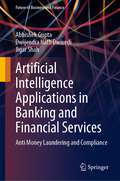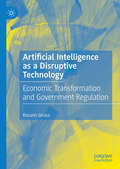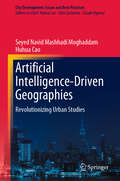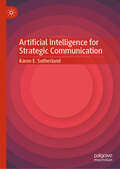- Table View
- List View
Artifacts and Organizations: Beyond Mere Symbolism (Organization and Management Series)
by Anat Rafaeli Michael G. PrattArtifacts in organizations are ubiquitous but often overlooked. The chapters in this book illustrate that artifacts are everywhere in organizational life. They prevail in how offices are decorated, language is used, business cards are designed, and office cartoons are displayed. In addition, artifacts can be seen in the name of an organization and its employees, products, buildings, processes, and contracts, and they represent people, organizations, and professions.Artifacts and Organizations suggests that artifacts are neither superficial nor pertinent only to organizational culture. They are relevant to a rich and diverse set of organizational processes within and across multiple levels of analysis. Artifacts are shown to be integral to identity, sense-giving and sense-making processes, interpretation and negotiation, legitimacy, and branding. The book seeks to communicate that artifacts are often much more than what is currently recognized in organizational research. The four sections of this edited volume address various aspects of what is known about and known through artifacts. Together, the full set of chapters challenge the field to move beyond a narrow conceptualization and understanding of artifacts in organizations.This book leads students to embrace the full complexity and richness of artifacts. In addition, the text seeks to inspire those who focus on artifacts as symbols to delve deeper into the complexities of artifacts-in-use, for individuals, organizations, and institutions.
Artifactual: Forensic and Documentary Knowing (Experimental Futures)
by Elizabeth Anne DavisIn Artifactual, Elizabeth Anne Davis explores how Cypriot researchers, scientists, activists, and artists process and reckon with civil and state violence that led to the enduring division of the island, using forensic and documentary materials to retell and recontextualize conflicts between and within the Greek-Cypriot and Turkish-Cypriot communities. Davis follows forensic archaeologists and anthropologists who attempt to locate, identify, and return to relatives the remains of Cypriots killed in those conflicts. She turns to filmmakers who use archival photographs and footage to come to terms with political violence and its legacies. In both forensic science and documentary filmmaking, the dynamics of secrecy and revelation shape how material remains such as bones and archival images are given meaning. Throughout, Davis demonstrates how Cypriots navigate the tension between an ethics of knowledge, which valorizes truth as a prerequisite for recovery and reconciliation, and the politics of knowledge, which renders evidence as irremediably partial and perpetually falsifiable.
Artifak: Cultural Revival, Tourism, and the Recrafting of History in Vanuatu
by Hugo DeBlockIn Vanuatu, commoditization and revitalization of culture and the arts do not necessarily work against each other; both revolve around value formation and the authentication of things. This book investigates the meaning and value of (art) objects as commodities in differing states of transit and transition: in the local place, on the market, in the museum. It provides an ethnographic account of commoditization in a context of revitalization of culture and the arts in Vanuatu, and the issues this generates, such as authentication of actions and things, indigenized copyright, and kastom disputes over ownership and the nature of kastom itself.
Artifak: Cultural Revival, Tourism, and the Recrafting of History in Vanuatu
by Hugo DeBlockIn Vanuatu, commoditization and revitalization of culture and the arts do not necessarily work against each other; both revolve around value formation and the authentication of things. This book investigates the meaning and value of (art) objects as commodities in differing states of transit and transition: in the local place, on the market, in the museum. It provides an ethnographic account of commoditization in a context of revitalization of culture and the arts in Vanuatu, and the issues this generates, such as authentication of actions and things, indigenized copyright, and kastom disputes over ownership and the nature of kastom itself.
Artificial Communication: How Algorithms Produce Social Intelligence (Strong Ideas)
by Elena EspositoA proposal that we think about digital technologies such as machine learning not in terms of artificial intelligence but as artificial communication.Algorithms that work with deep learning and big data are getting so much better at doing so many things that it makes us uncomfortable. How can a device know what our favorite songs are, or what we should write in an email? Have machines become too smart? In Artificial Communication, Elena Esposito argues that drawing this sort of analogy between algorithms and human intelligence is misleading. If machines contribute to social intelligence, it will not be because they have learned how to think like us but because we have learned how to communicate with them. Esposito proposes that we think of &“smart&” machines not in terms of artificial intelligence but in terms of artificial communication. To do this, we need a concept of communication that can take into account the possibility that a communication partner may be not a human being but an algorithm—which is not random and is completely controlled, although not by the processes of the human mind. Esposito investigates this by examining the use of algorithms in different areas of social life. She explores the proliferation of lists (and lists of lists) online, explaining that the web works on the basis of lists to produce further lists; the use of visualization; digital profiling and algorithmic individualization, which personalize a mass medium with playlists and recommendations; and the implications of the &“right to be forgotten.&” Finally, she considers how photographs today seem to be used to escape the present rather than to preserve a memory.
Artificial Culture: Identity, Technology, and Bodies (Routledge Research in Cultural and Media Studies)
by Tama LeaverArtificial Culture is an examination of the articulation, construction, and representation of "the artificial" in contemporary popular cultural texts, especially science fiction films and novels. The book argues that today we live in an artificial culture due to the deep and inextricable relationship between people, our bodies, and technology at large. While the artificial is often imagined as outside of the natural order and thus also beyond the realm of humanity, paradoxically, artificial concepts are simultaneously produced and constructed by human ideas and labor. The artificial can thus act as a boundary point against which we as a culture can measure what it means to be human. Science fiction feature films and novels, and other related media, frequently and provocatively deploy ideas of the artificial in ways which the lines between people, our bodies, spaces and culture more broadly blur and, at times, dissolve. Building on the rich foundational work on the figures of the cyborg and posthuman, this book situates the artificial in similar terms, but from a nevertheless distinctly different viewpoint. After examining ideas of the artificial as deployed in film, novels and other digital contexts, this study concludes that we are now part of an artificial culture entailing a matrix which, rather than separating minds and bodies, or humanity and the digital, reinforces the symbiotic connection between identities, bodies, and technologies.
The Artificial Empire: The Indian Landscapes of William Hodges
by G. H. TillotsonThe role of the visual arts in the assertion of European colonial power has been the subject of much recent investigation and redefinition. This book takes as a ground for discussion the representation of Indian scenery and architecture by British artists in the late eighteenth and early nineteenth centuries. It includes the work of a diversity of
Artificial General Intelligence: 5th Workshop On Computer Games, Cgw 2016, And 5th Workshop On General Intelligence In Game-playing Agents, Giga 2016, Held In Conjunction With The 25th International Conference On Artificial Intelligence, Ijcai 2016, New York, Usa, July 9-10, 2016, Revised Selected Papers (The MIT Press Essential Knowledge series #705)
by Julian TogeliusHow to make AI capable of general intelligence, and what such technology would mean for society.Artificial intelligence surrounds us. More and more of the systems and services you interact with every day are based on AI technology. Although some very recent AI systems are generalists to a degree, most AI is narrowly specific; that is, it can only do a single thing, in a single context. For example, your spellchecker can’t do mathematics, and the world's best chess-playing program can’t play Tetris. Human intelligence is different. We can solve a variety of tasks, including those we have not seen before. In Artificial General Intelligence, Julian Togelius explores technical approaches to developing more general artificial intelligence and asks what general AI would mean for human civilization.Togelius starts by giving examples of narrow AI that have superhuman performance in some way. Interestingly, there have been AI systems that are superhuman in some sense for more than half a century. He then discusses what it would mean to have general intelligence, by looking at definitions from psychology, ethology, and computer science. Next, he explores the two main families of technical approaches to developing more general artificial intelligence: foundation models through self-supervised learning, and open-ended learning in virtual environments. The final chapters of the book investigate potential artificial general intelligence beyond the strictly technical aspects. The questions discussed here investigate whether such general AI would be conscious, whether it would pose a risk to humanity, and how it might alter society.
Artificial Horizon
by Thomas, MartinMartin Thomas takes the reader on a journey through a compelling study of culture, landscape and mythology. For both Aboriginal people and their colonisers, the rugged landscape of the Blue Mountains has stood as an intriguing riddle and a stimulus to the imagination. The author evokes this dramatic and bewildering landscape and leads his readers through the cultural history of the locality in order to probe the 'dreamwork of imperialism'.
Artificial Intelligence: A Guide for Thinking Humans (Pelican Bks.)
by Melanie MitchellNo recent scientific enterprise has proved as alluring, terrifying, and filled with extravagant promise and frustrating setbacks as artificial intelligence. The award-winning author Melanie Mitchell, a leading computer scientist, now reveals AI’s turbulent history and the recent spate of apparent successes, grand hopes, and emerging fears surrounding it.In Artificial Intelligence, Mitchell turns to the most urgent questions concerning AI today: How intelligent—really—are the best AI programs? How do they work? What can they actually do, and when do they fail? How humanlike do we expect them to become, and how soon do we need to worry about them surpassing us? Along the way, she introduces the dominant models of modern AI and machine learning, describing cutting-edge AI programs, their human inventors, and the historical lines of thought underpinning recent achievements. She meets with fellow experts such as Douglas Hofstadter, the cognitive scientist and Pulitzer Prize–winning author of the modern classic Gödel, Escher, Bach, who explains why he is “terrified” about the future of AI. She explores the profound disconnect between the hype and the actual achievements in AI, providing a clear sense of what the field has accomplished and how much further it has to go. Interweaving stories about the science of AI and the people behind it, Artificial Intelligence brims with clear-sighted, captivating, and accessible accounts of the most interesting and provocative modern work in the field, flavored with Mitchell’s humor and personal observations. This frank, lively book is an indispensable guide to understanding today’s AI, its quest for “human-level” intelligence, and its impact on the future for us all.
Artificial Intelligence: Evolution, Ethics and Public Policy
by Saswat Sarangi Pankaj SharmaWhat will the future be? A dystopian landscape controlled by machines or a brave new world full of possibilities? Perhaps the answer lies with Artificial Intelligence (AI)—a phenomenon much beyond technology that has, continues to, and will shape lives in ways we do not understand yet. This book traces the evolution of AI in contemporary history. It analyses how AI is primarily being driven by "capital" as the only "factor of production" and its consequences for the global political economy. It further explores the dystopian prospect of mass unemployment by AI and takes up the ethical aspects of AI and its possible use in undermining natural and fundamental rights. A tract for the times, this volume will be a major intervention in an area that is heavily debated but rarely understood. It will be essential reading for researchers and students of digital humanities, politics, economics, science and technology studies, physics, and computer science. It will also be key reading for policy makers, cyber experts and bureaucrats.
Artificial Intelligence (AI) in Social Research
The field of social research is characterized by its broad scope and interdisciplinary nature, encompassing the examination of human behaviour, societies, and various facets of social existence; however, it is influenced by numerous factors, including technological advancements. It is therefore no surprise that Artificial Intelligence (AI) has rapidly become a driving force, bringing about substantial transformations within the field. The use of AI-assisted tools and programmes for the collection, analysis, and interpretation of both quantitative and qualitative data is increasing at a remarkable pace. The implications of utilizing these applications are significant and noteworthy. While these technologies present numerous opportunities, it is important to acknowledge the accompanying dilemmas and risks associated with this form of technological advancement. With a focus on AI's research implications, this book explores various considerations and examples across different disciplines of social research. It highlights the considerable promise AI holds for revolutionizing the discipline while also guiding readers in contemplating the potential drawbacks and various concerns. By doing so, researchers can optimize the capabilities of AI and promote its responsible, reliable, and beneficial application in enhancing and advancing social research.
Artificial Intelligence and Blockchain for Social Impact: Social Business Models and Impact Finance
by Wolfgang Spiess-KnaflArtificial Intelligence and Blockchain for Social Impact provides an accessible overview of artificial intelligence (AI) and blockchain technologies, and explores their applications for social enterprise and impact investing. The opening chapter introduces the impact space, exploring different social business models, the role of technology, the impact investing market and general problems in the space. The remainder of this book falls into two paths: the first focusing on AI and the other looking at the blockchain technology. Providing introductions to each of these technologies and their histories, the author goes on to examine them from the perspectives of social business models and impact finance. A concluding chapter explores AI and cryptocurrencies in the impact space in the future. Readers are supported with international case studies and other student-friendly features. Situated at the intersection between technology, fintech, social enterprise, impact investing and social impact, this book is a valuable resource for upper-level courses across all these areas. It also offers an introduction to this emerging topic for researchers and business professionals. Online teaching resources to accompany this book include instructor lecture slides and data sets.
Artificial Intelligence and Evaluation: Emerging Technologies and Their Implications for Evaluation (Comparative Policy Evaluation)
by Steffen Bohni Nielsen, Francesco Mazzeo Rinaldi and Gustav Jakob PeterssonArtificial Intelligence and Evaluation: Emerging Technologies and Their Implications for Evaluation is a groundbreaking exploration of how the landscape of program evaluation will be redefined by artificial intelligence and other emerging digital technologies.In an era where digital technologies and artificial intelligence (AI) are rapidly evolving, this book presents a pivotal resource for evaluators navigating the transformative intersection of their practice and cutting-edge technology. Addressing the dual dimensions of how evaluations are conducted and what is evaluated, a roster of distinguished contributors illuminate the impact of AI on program evaluation methodologies. Offering a discerning overview of various digital technologies, their promises and perils, they carefully dissect the implications for evaluative processes and debate how evaluators must be equipped with the requisite skills to harness the full potential of AI tools. Further, the book includes a number of compelling use cases, demonstrating the tangible applications of AI in diverse evaluation scenarios. The use cases range from the application of GIS data to advanced text analytics. As such, this book provides evaluators with inspirational cases on how to apply AI in their practice as well as what pitfalls one must look out for.Artificial Intelligence and Evaluation is an indispensable guide for evaluators seeking to not only adapt to but thrive in the dynamic landscape of evaluation practices reshaped by the advent of artificial intelligence.The Open Access version of this book, available at http://www.taylorfrancis.com, has been made available under a Creative Commons Attribution-Non Commercial-No Derivatives 4.0 license.
Artificial Intelligence and Its Contexts: Security, Business and Governance (Advanced Sciences and Technologies for Security Applications)
by Anna Visvizi Marek BodzianyThis book offers a comprehensive approach to the question of how artificial intelligence (AI) impacts politics, economy, and the society today. In this view, it is quintessential for understanding the complex nature of AI and its role in today’s world. The book has been divided into three parts. Part one is devoted to the question of how AI will be used for security and defense purposes, including combat in war zones. Part two looks at the value added of AI and machine learning for decision-making in the fields of politics and business. Part three consists of case studies—covering the EU, the USA, Saudi Arabia, Portugal, and Poland—that discuss how AI is being used in the realms of politics, security and defense. The discussion in the book opens with the question of the nature of AI, as well as of ethics and the use of AI in combat. Subsequently, the argument covers issues as diverse as the militarization of AI, the use of AI in strategic studies and military strategy design. These topics are followed by an insight into AI and strategic communication (StratCom), including disinformation, as well as into AI and finance. The case-studies included in part 3 of the book offer a captivating overview of how AI is being employed to stimulate growth and development, to promote data- and evidence-driven policy-making, to enable efficient and inclusive digital transformation and other related issues. Written by academics and practitioners in an academically sound, yet approachable manner, this volume queries issues and topics that form the thrust of processes that transform world politics, economics and society. As such, this volume will serve as the primer for students, researchers, lectures and other professionals who seek to understand and engage with the variety of issues AI implicates.
Artificial Intelligence and Its Discontents: Critiques from the Social Sciences and Humanities (Social and Cultural Studies of Robots and AI)
by Ariane HanemaayerOn what basis can we challenge Artificial Intelligence (AI) - its infusion, investment, and implementation across the globe? This book answers this question by drawing on a range of critical approaches from the social sciences and humanities, including posthumanism, ethics and human values, surveillance studies, Black feminism, and other strategies for social and political resistance. The authors analyse timely topics, including bias and language processing, responsibility and machine learning, COVID-19 and AI in health technologies, bio-AI and nanotechnology, digital ethics, AI and the gig economy, representations of AI in literature and culture, and many more. This book is for those who are currently working in the field of AI critique and disruption as well as in AI development and programming. It is also for those who want to learn more about how to doubt, question, challenge, reject, reform and otherwise reprise AI as it been practiced and promoted.
Artificial Intelligence and National Security
by Reza MontasariThis book analyses the implications of the technical, legal, ethical and privacy challenges as well as challenges for human rights and civil liberties regarding Artificial Intelligence (AI) and National Security. It also offers solutions that can be adopted to mitigate or eradicate these challenges wherever possible.As a general-purpose, dual-use technology, AI can be deployed for both good and evil. The use of AI is increasingly becoming of paramount importance to the government’s mission to keep their nations safe. However, the design, development and use of AI for national security poses a wide range of legal, ethical, moral and privacy challenges. This book explores national security uses for Artificial Intelligence (AI) in Western Democracies and its malicious use. This book also investigates the legal, political, ethical, moral, privacy and human rights implications of the national security uses of AI in the aforementioned democracies. It illustrates how AI for national security purposes could threaten most individual fundamental rights, and how the use of AI in digital policing could undermine user human rights and privacy. In relation to its examination of the adversarial uses of AI, this book discusses how certain countries utilise AI to launch disinformation attacks by automating the creation of false or misleading information to subvert public discourse. With regards to the potential of AI for national security purposes, this book investigates how AI could be utilized in content moderation to counter violent extremism on social media platforms. It also discusses the current practices in using AI in managing Big Data Analytics demands. This book provides a reference point for researchers and advanced-level students studying or working in the fields of Cyber Security, Artificial Intelligence, Social Sciences, Network Security as well as Law and Criminology. Professionals working within these related fields and law enforcement employees will also find this book valuable as a reference.
Artificial Intelligence and Playable Media
by Eric FreedmanThis book introduces readers to artificial intelligence (AI) through the lens of playable media and explores the impact of such software on everyday life. From video games to robotic companions to digital twins, artificial intelligence drives large sectors of the culture industry where play, media and machine learning coexist. This book illustrates how playable media contribute to our sense of self, while also harnessing our data, tightening our bonds with computation and realigning play with the demands of network logic. Author Eric Freedman examines a number of popular media forms - from the Sony AIBO robotic dog, video game developer Naughty Dog’s Uncharted and The Last of Us franchises, to Peloton’s connected fitness equipment - to lay bare the computational processes that undergird playable media, and addresses the social, cultural, technological and economic forces that continue to shape user-centered experience and design. The case studies are drawn from a number of related research fields, including science and technology studies, media studies and software studies. This book is ideal for media studies students, scholars and practitioners interested in understanding how applied artificial intelligence works in popular, public and visual culture.
Artificial Intelligence and the City: Urbanistic Perspectives on AI
by Federico Cugurullo Federico Caprotti Matthew Cook Andrew Karvonen Pauline McGuirk Simon MarvinThis book explores in theory and practice how artificial intelligence (AI) intersects with and alters the city. Drawing upon a range of urban disciplines and case studies, the chapters reveal the multitude of repercussions that AI is having on urban society, urban infrastructure, urban governance, urban planning and urban sustainability. Contributors also examine how the city, far from being a passive recipient of new technologies, is influencing and reframing AI through subtle processes of co-constitution. The book advances three main contributions and arguments: First, it provides empirical evidence of the emergence of a post-smart trajectory for cities in which new material and decision-making capabilities are being assembled through multiple AIs. Second, it stresses the importance of understanding the mutually constitutive relations between the new experiences enabled by AI technology and the urban context. Third, it engages with the concepts required to clarify the opaque relations that exist between AI and the city, as well as how to make sense of these relations from a theoretical perspective. Artificial Intelligence and the City offers a state-of-the-art analysis and review of AI urbanism, from its roots to its global emergence. It cuts across several disciplines and will be a useful resource for undergraduates and postgraduates in the fields of urban studies, urban planning, geography, architecture, urban design, science and technology studies, sociology and politics.
Artificial Intelligence and the Future of International Law: Bridging Rights, Trade, and Arbitration (SpringerBriefs in Law)
by Abbas PoorhashemiImagine a future of international law in which artificial intelligence reshapes human rights, trade, and arbitration. This work deals with the most burning issues of our times: how AI is no longer a tool but the force of transformation par excellence for global governance. Leading scholars and practitioners bring together an informed analysis of the challenges and opportunities artificial intelligence brings to the legal landscape. The text takes a comprehensive dimension - from ethical dilemmas to technical hurdles - by going in-depth concerning every chapter on what AI can do for international law. Whether researcher, legal professional, or policymaker, there is much to learn from these insights and how they shape the view of the role AI could potentially play within the law and redefine what justice looks like on a global scale. Prepare to be challenged, enlightened, and inspired by a work that dares to ask the hard questions - and teases at the answers waiting just beyond the horizon.
Artificial Intelligence and the Law: Cybercrime and Criminal Liability
by Dennis J. Baker Paul H. RobinsonThis volume presents new research in artificial intelligence (AI) and Law with special reference to criminal justice. It brings together leading international experts including computer scientists, lawyers, judges and cyber-psychologists. The book examines some of the core problems that technology raises for criminal law ranging from privacy and data protection, to cyber-warfare, through to the theft of virtual property. Focusing on the West and China, the work considers the issue of AI and the Law in a comparative context presenting the research from a cross-jurisdictional and cross-disciplinary approach. As China becomes a global leader in AI and technology, the book provides an essential in-depth understanding of domestic laws in both Western jurisdictions and China on criminal liability for cybercrime. As such, it will be a valuable resource for academics and researchers working in the areas of AI, technology and criminal justice.
Artificial Intelligence Applications in Banking and Financial Services: Anti Money Laundering and Compliance (Future of Business and Finance)
by Abhishek Gupta Dwijendra Nath Dwivedi Jigar ShahThis book discusses all aspects of money laundering, starting from traditional approach to financial crimes to artificial intelligence-enabled solutions. It also discusses the regulators approach to curb financial crimes and how syndication among financial institutions can create a robust ecosystem for monitoring and managing financial crimes. It opens with an introduction to financial crimes for a financial institution, the context of financial crimes, and its various participants. Various types of money laundering, terrorist financing, and dealing with watch list entities are also part of the discussion. Through its twelve chapters, the book provides an overview of ways in which financial institutions deal with financial crimes; various IT solutions for monitoring and managing financial crimes; data organization and governance in the financial crimes context; machine learning and artificial intelligence (AI) in financial crimes; customer-level transaction monitoring system; machine learning-driven alert optimization; AML investigation; bias and ethical pitfalls in machine learning; and enterprise-level AI-driven Financial Crime Investigation (FCI) unit. There is also an Appendix which contains a detailed review of various data sciences approaches that are popular among practitioners.The book discusses each topic through real-life experiences. It also leverages the experience of Chief Compliance Officers of some large organizations to showcase real challenges that heads of large organizations face while dealing with this sensitive topic. It thus delivers a hands-on guide for setting up, managing, and transforming into a best-in-class financial crimes management unit. It is thus an invaluable resource for researchers, students, corporates, and industry watchers alike.
Artificial Intelligence as a Disruptive Technology: Economic Transformation and Government Regulation
by Rosario GirasaArtificial intelligence (AI) is the latest technological evolution which is transforming the global economy and is a major part of the “Fourth Industrial Revolution.” This book covers the meaning, types, subfields and applications of AI, including U.S. governmental policies and regulations, ethical and privacy issues, particularly as they pertain and affect facial recognition programs and the Internet-of Things (IoT). There is a lengthy analysis of bias, AI’s effect on the current and future job market, and how AI precipitated fake news. In addition, the text covers basics of intellectual property rights and how AI will transform their protection. The author then moves on to explore international initiatives from the European Union, China’s New Generation Development Plan, other regional areas, and international conventions. The book concludes with a discussion of super intelligence and the question and applicability of consciousness in machines. The interdisciplinary scope of the text will appeal to any scholars, students and general readers interested in the effects of AI on our society, particularly in the fields of STS, economics, law and politics.
Artificial Intelligence-Driven Geographies: Revolutionizing Urban Studies (City Development: Issues and Best Practices)
by Huhua Cao Seyed Navid MoghaddamThis groundbreaking book delves deep into the history of AI, the major techniques and algorithms of machine learning and deep learning, and the critical role of data sources and processing in these disciplines. It covers a range of AI applications in human geography, including population distribution, land use, environmental risk assessment, and socioeconomic analysis. In urban planning, the book explores AI-driven approaches to smart cities, transportation management, urban growth prediction, and sustainable development, among others. As AI continues to permeate every aspect of human life, it is essential to understand and address the ethical considerations and challenges associated with AI-driven planning. This book tackles crucial issues such as data privacy, algorithmic bias, equitable access to technology, and the future of employment in the fields of geography and urban planning. In addition, it presents inspiring case studies, highlighting successful AI applications in human geography and urban planning, and offers insights into future research directions and challenges. This book is a must-read for students, researchers, and professionals in geography, urban planning, environmental studies, and related fields. It is also an invaluable resource for policymakers and urban planners seeking to leverage the power of AI to create smarter, more sustainable, and equitable cities and communities. This book equips you with the knowledge and tools to harness the potential of AI, leading the way to a better understanding of our world and a brighter future for all.
Artificial Intelligence for Strategic Communication
by Karen E. SutherlandIn an era where AI is revolutionising every aspect of communication, this groundbreaking research monograph provides an essential roadmap for navigating the intersection of artificial intelligence and strategic communication. Drawing on extensive primary research, including interviews with 41 experts and surveys of 400 professionals across three continents and eight countries, this book provides insights from relevant scholars, communication practitioners and AI tool developers. This comprehensive guide combines scholarly rigour with practical application, presenting a data-informed Model for Practice that helps to withstand the constant evolution of AI technology. Each chapter delivers research-informed, actionable tools relating to the multifaceted field of strategic communication including ethical practice, strategy development, content creation, evaluation, and continuous improvement. Bridging the gap between theoretical understanding and practical implementation, AI for Strategic Communication is an invaluable resource for strategic communication scholars, students, and practitioners, essential for advancing careers in the age of AI. This work emerged from the need for a comprehensive source combining scholarly, practitioner and AI developer perspectives on strategic communication from around the globe.
